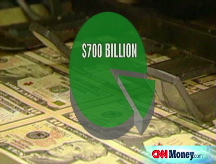Global stocks fall sharply
World markets follow Wall Street lower as economic fears batter sentiment. Japan's benchmark Nikkei slides nearly 7%.
LONDON (CNNMoney.com) -- Overseas stock markets fell sharply Thursday, taking a cue from Wall Street, as investors remained anxious about the grim outlook for the global economy and corporate profits.
U.S. stock futures, which offer an indication of how Wall Street will open when trading begins in New York, were lower.
In Asia, Japan's benchmark Nikkei 225 index sank 6.9%. Seoul's KOSPI index dropped 6.7%, while Australia's All Ordinaries index closed 4.3% lower and Hong Kong's Hang Seng index fell 4%.
The market slumped as Japan's Finance Ministry announced a $663 million trade deficit in October -- the first for the month in 28 years -- after a slowing global economy cut into the nation's exports.
European shares tumbled in the early going. Britain's FTSE 100 was down 2% in morning trading while the CAC-40 in France and Germany's DAX were both down about 3%.
Iceland secured a $4.6 billion bailout to help the country amid the collapse of its banking system. Nordic countries agreed to lend Iceland $2.5 billion, bolstering a $2.1 billion aid package from the International Monetary Fund.
Global markets mounted losses after a massive selloff on Wall Street. The Dow Jones industrial average shed more than 400 points, or 5%, on Wednesday. The blue-chip index closed below 8,000 for the first time since March 2003.
The Standard & Poor's 500 index slid 6% to its lowest level since March 2003. And the Nasdaq composite lost 6.5% to settle at its lowest point since April 2003.
Stocks languished for most of the day, with the selloff accelerating near the close of trade. Wednesday's dramatic retreat erased gains made in the previous session.
"The market is fearful of the fallout from the credit crisis and the global economic slowdown," said Todd Salamone, market strategist at Schaeffer's Investment Research.
Investors are grappling with a possible bankruptcy in the automotive industry, something analysts say could have dire implications for the broader economy, as a second day of congressional hearings ended without resolution.
"The crisis of confidence is back on the front page," said said Todd Morgan, senior managing director of Bel Air Investment Advisors, a Los Angeles-based firm with nearly $6 billion in assets under management. "You need some positive catalyst, something, to change the attitude of investors [and] the auto debate is hurting confidence."
Meanwhile, weak readings on the nation's housing market and a sharp decline in consumer prices reflected the challenges facing the economy and drove down shares of financial services firms.
Also on Wednesday, the Federal Reserve released minutes from its most recent meeting that showed the central bank has significantly lowered its outlook for economic activity this year and next. It also signaled that more interest rate cuts may be needed to prevent further damage to the battered economy. ![]()



